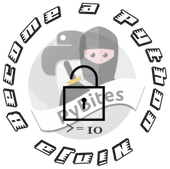In this information-overloaded age, knowing about productivity has become even more important. In this post I'll outline 5 ways to enhance your efficiency. I firmly believe that you can gain 3+ times more results by applying these principles.

I got my inspiration from reading self-development books and listening to influential speakers. You will find links to some of them. I might dedicate future posts to more specific info for each principle. Here we go ..
1. Set goals / divide into tasks / get started
Setting goals is an extremely powerful tool. Set ambitious but realistic goals and just get started. Divide the goals into pieces/ tasks. Set 2 or 3 important goals (or tasks if the goals are big) for the day, preferably the night before to have more motivation to get up (early) in the morning.
Don't open you mail first thing in the morning and start working on your goals (email might be a tool in some cases, but it often causes interruptions, see 3.). The power of less (by Leo Babauta, see also 5.) explains this in more detail and it is an interesting read for anybody who wants to achieve more in life.
2. Unclutter / 80-20 rule / parkinson: set deadlines
Use the Pareto principle to filter out the 20% that carries 80% of the weight. This can be 10/90 depending the situation. This often applies to customers: 3 big customers generate 80+ % of the revenue, but you can express it in time as well: we might loose 80% of the time to 20% of the added value. We need to turn it upside-down: identify the 20% of time/activities that create 80% of the value.
Use the ley of Parkinson to set deadlines. You'll be amazed what you can achieve if you have a limited time to do it, it forces you to make decisions and to FOCUS. We all have had tight deadlines, but isn't it when we become most efficient? To some extend: less time to do it the more you identify the 20% that really matters. More on these principles and improving productivity, can be found in Timothy Ferriss' the 4 hour workweek and in (audio)books of Brian Tracey and Jim Rohn
3. No distractions / 25 min work <-> 5 min break / bundle interruptions
Turn off email, twitter, facebook, or unplug the Internet if possible. Small things like mail-client alerts and chat popups are the worst, but easiest to eliminate. It's best to do email and social media rounds in batches. The Pomodoro technique can help you, because you'll work in blocks of 25 min (so called 'pomodoros') with 5 min breaks. I learned about it on Benny Lewis' interesting language learning blog. As concentration decreases over time (and refreshes with only a short break), 25 min is a reasonable time.
Interruptions are the worst enemy for being efficient. It requires a lot of discipline to accumulate them all to one block or batch and handle them at once. However, keep in mind that 25 min of "flow" (a state where we forget our surroundings and purely focus on the task at hand) is easily worth 1 or 2 hours of interrupted work. Do the maths and we have the 3+ of the blog title. Personally turning on music is a great way for me to get into the flow, but you might have other tools.
4. We are not designed to multitask
It's the hardest one I think. Multitasking is tricky, because we think that we are more effective by doing it. Our brains however are not a multi-threaded CPU. We designed computers to do heavy, repetitious tasks, all at once. Our brains are quite the opposite: many of our tasks are rather intuitive and require hard human thinking. Solution: work on one task at the time, short break, go with the next task. Even though you change every 15 min, the important thing is to work linear not in parallel. If you finished the task reward yourself with some tweets, mails, stretching or a good coffee. See also: Multi-Tasking is Bad For Your Brain.
5. Get up early / advantages of the morning
.. even if it's only one hour earlier. Of course there are people that are more productive at night, I was once.. There are quite some advantages though. Leo Babauta expresses it very well in 10 Benefits of Rising Early, and How to Do It: the morning rise is one of the greatest moments of the day, less distractions, no rush and it's a great feeling having achieved 1 or more important tasks early in the day.
Update 21.02.2016
I just wrote a follow up post.
